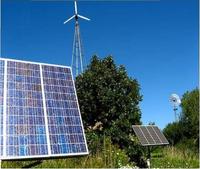-
Calculating the energy required to store wind and solar power on the grid

Renewable energy holds the promise of reducing carbon dioxide emissions. There are times, however, when solar and wind farms generate more electricity than is needed by consumers. Storing that surplus energy in batteries for later use seems like an obvious solution, but a new study from Stanford University suggests that might not always be the case.
-
-
Future of coal in Australia riskier than renewables
Coal-fired electricity may have little or no economic future in Australia, even if carbon capture and storage becomes commercially available, a new analysis has found. The study shows that coal with carbon capture and storage scenarios are likely to struggle to compete economically with 100 percent renewable electricity in a climate-constrained world, even if carbon capture and storage is commercialized by 2030.
-
-
Shale gas threatens U.S. nuclear power industry
The U.S. nuclear industry is facing a new enemy, and it is not anti-nuclear peacenicks. It is the shale gas boom, which on Tuesday claimed yet another victim when Entergy Corporation said it would close its Vermont Yankee reactor ahead of schedule. It is the fourth U.S nuclear plant to be closed this year, as utilities have concluded that investing in refurbishing older reactors is no longer economically viable.
-
-
New reactor design makes nuclear power competitive with natural gas

San Diego-based General Atomics has applied for funding of several hundred millions from the U.S Department of Energy to commercialize a nuclear reactor which, the firm claims, could cut the cost of nuclear power by as much as 40 percent. The new design replaces water with helium as a coolant, allowing the plant to operate at higher temperatures, thus increasing the efficiency of the power plan and reducing the amount of waste needing storage.
-
-
Breakthrough fuel cell technology: the future of electricity generation
We currently rely upon an increasingly vulnerable electrical grid to provide the energy we need. The best way to decrease that vulnerability is through distributed energy, that is, by making our own energy on-site. A breakthrough fuel cell technology promises to provide always-on electricity to businesses, homes, and eventually automobiles, at about one-tenth the cost and one-tenth the size of current commercial fuel cell systems. The technology allows people to generate their own electricity with a system nearly impervious to hurricanes, thunderstorms, cyberattacks, derechos, and similar dangers, while simultaneously helping the environment.
-
-
Small modular reactors (SMEs) a “poor bet” to revive U.S. nuclear renaissance: report
A shift to small modular reactors (SMRs) is unlikely to breathe new life into the troubled U.S. nuclear power industry, since SMRs will likely require tens of billions of dollars in federal subsidies or government purchase orders, create new reliability vulnerabilities, as well as concerns in relation to both safety and proliferation, according a report issued last week.
-
-
Aging grid limiting exploitation of wind power potential
Energy firms and utility companies continue to invest in wind power, as evident in the increasing number of wind turbines on the prairies of the Midwest, but the aging infrastructure of the nation’s power grid is limiting the potential of this clean energy source.
-
-
Mapping out an alternative energy future for New York
New York governor Andrew Cuomo will soon decide whether to approve hydraulic fracturing for natural gas in the state. To date, no alternative to expanded gas drilling has been proposed.A new study finds that it is technically and economically feasible to convert New York’s all-purpose energy infrastructure to one powered by wind, water, and sunlight (WWS).
-
-
Testing feasibility of deep geological storage of CO2 emissions
An injection of carbon dioxide, or CO2, has begun at a site in southeastern Washington to test deep geologic storage. Researchers are injecting 1,000 tons of CO2 one-half mile underground to see whether the greenhouse gas can be stored safely and permanently in ancient basalt flows. The United States and portions of Canada have enough potential capacity in geologic formations to store as much as 900 years of CO2 emissions.
-
-
Powering 1,000 homes would require using 32 acres for solar power plants
The Energy Department’s National Renewable Energy Laboratory (NREL) has published a report on the land use requirements of solar power plants based on actual land-use practices from existing solar facilities. Powering 1,000 homes would require setting aside 32 acres for solar power plants.
-
-
Water reservoirs for hydroelectric dams are sources of greenhouse gas emissions

The large reservoirs of water behind the world’s 50,000 large dams are a known source of methane. Like carbon dioxide, methane is one of the greenhouse gases which trap heat near Earth’s surface and contribute to global warming. Methane, however, has a warming effect twenty-five times more powerful than carbon dioxide. The methane comes from organic matter in the sediments that accumulate behind dams.
-
-
Dams play an important role in water pollution control

Small dams, reservoirs and ponds trap water pollution, which provides an important benefit to water resources. This is especially relevant in agricultural lands of the Midwest U.S., where there are lots of small, but aging, dams.
-
-
Bacteria to clean contaminated leftover water used in fracking

Fracking is a drilling technique which uses lots of water — up to 5-7 million gallons per frack. One well may be fracked several times. The water goes in clean and comes out contaminated with organic substances that render it unfit for reuse. Purifying that water would reduce the pressure on waste disposal sites called injection wells, as well as on sites of wastewater spills. Researchers say that bacteria may someday clean leftover frack water.
-
-
Analysts: arrogance, clumsiness of oil and gas industry caused fracking’s bad image
Oil and gas industry experts say arrogance, secrecy, and poor communication by the drilling industry have led to public anger over hydraulic fracturing, or fracking. These experts are calling for fracking companies to release more information to alleviate public concerns about the relationship between the drilling technology and water contamination.
-
-
Well water contaminants highest near natural gas drilling: study
A new study of 100 private water wells in and near the Barnett Shale showed elevated levels of potential contaminants such as arsenic and selenium closest to natural gas extraction sites. Researchers believe the increased presence of metals could be due to a variety of factors including: industrial accidents such as faulty gas well casings; mechanical vibrations from natural gas drilling activity disturbing particles in neglected water well equipment; or the lowering of water tables through drought or the removal of water used for the hydraulic fracturing process. Any of these scenarios could release dangerous compounds into shallow groundwater.
-
More headlines
The long view
Using Liquid Air for Grid-Scale Energy Storage
New research finds liquid air energy storage could be the lowest-cost option for ensuring a continuous power supply on a future grid dominated by carbon-free but intermittent sources of electricity.
Enhanced Geothermal Systems: A Promising Source of Round-the-Clock Energy
With its capacity to provide 24/7 power, many are warming up to the prospect of geothermal energy. Scientists are currently working to advance human-made reservoirs in Earth’s deep subsurface to stimulate the activity that exists within natural geothermal systems.
Experts Discuss Geothermal Potential
Geothermal energy harnesses the heat from within Earth—the term comes from the Greek words geo (earth) and therme (heat). It is an energy source that has the potential to power all our energy needs for billions of years.
